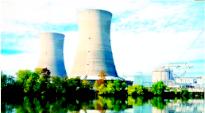Nuclear Renaissance Slow to Come
 The Economist reports:
The Economist reports:
Nuclear power should be hot. It emits virtually no carbon dioxide. It requires no costly imports of oil from countries that breed terrorists. Even greens don’t hate it as much as they used to. What’s for a politician not to like?
Five years ago, George Bush became the first American president to visit a nuclear-power plant in 30 years. In 2007 Congress voted to fund a federal loan guarantee for the construction of new ones. In January Barack Obama embraced his predecessor’s vision, pledging to build a “new generation of safe, clean nuclear-power plants”. On February 1st he followed that up in his proposed budget for 2011 by tripling to $54 billion the value of loans for new nuclear plants the government is offering to guarantee.
Yet America’s much-predicted nuclear renaissance has yet to occur. On October 8th Constellation Energy, a power company, gave up trying to persuade the government to reduce its proposed fee for a loan guarantee for a planned nuclear plant on Chesapeake Bay. The government’s price “would clearly destroy…the economics of any nuclear project,” grumbled the firm. Experts now predict that the project, a joint venture with EDF, a French state-controlled electricity giant, will die.
The Nuclear Energy Institute (NEI), a trade association, blames the breakdown of negotiations with Constellation on “a ridiculous formulaic approach” by the White House Office of Management and Budget, which considered the Chesapeake Bay plant a very risky project. Despite this, the NEI sees “no evidence of a lack of commitment by the administration”. Others are not so sure. Some suspect that Mr Obama’s earlier nuke-boosting was a ploy to win Republican support (which never materializsd) for a climate bill.
Constellation’s decision is the latest in a series of blows to the industry. After Congress agreed in 2007 to fund loan guarantees, some 28 applications were filed to build new nuclear plants. America is the world’s largest producer of nuclear energy, but has not approved a single new plant since a scary (but non-lethal) nuclear accident at Three Mile Island in 1979. (The 50 or so plants that have opened since then already had regulatory approval; plans for dozens more were cancelled.)
The economic slowdown has reduced electricity consumption, which remains below the peak it reached in 2007. At the same time, there has been a sharp increase in the supply of non-nuclear electricity (gas, coal and wind) from plants built to meet a wrongly predicted spike in demand. Gas prices, which a few years ago were high enough to make power firms consider the nuclear option, are now much lower. Pessimism about the economy makes corporate America reluctant to undertake long-term capital investments. None of this bodes well for nuclear power.
To make matters worse, America has failed to adopt a coherent energy policy, let alone one that imposes a price on carbon. Everyone in the energy business believes that carbon-pricing will come, but when? It costs perhaps $9 billion to build a nuclear plant, and can take a decade (allowing maybe four years to get approval). With so much regulatory uncertainty, that is too big a bet for private investors—especially since projects of this kind often cost more than expected. Several plans to build nuclear plants have been shelved. Earlier this year Exelon, another power firm, suspended plans for a twin reactor in Texas (though it continues to seek regulatory approval, in case the economics improve).
Click here to read more.

